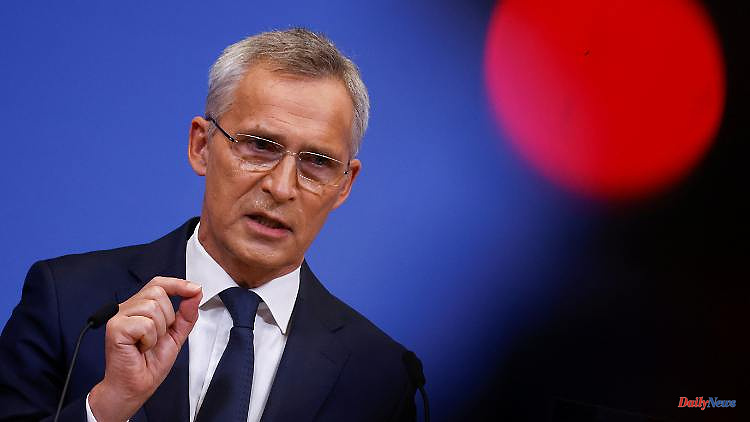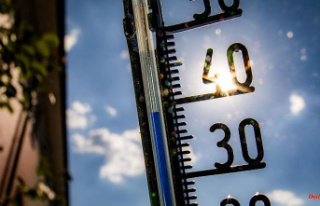NATO Secretary General Jens Stoltenberg praises Germany's efforts to end the war in Ukraine. At the same time, on the ZDF talk show "Maybrit Illner," he calls on the alliance countries to support Ukraine even more.
Somehow you know the TV talks about the war in Ukraine by now. On Thursday evening, however, the discussion on the ZDF talk show "Maybrit Illner" on this topic was particularly explosive. Because the NATO countries agreed at their summit meeting in Madrid to increase their existing rapid reaction force from 40,000 to 300,000 soldiers within three years. The US also wants to set up a military base in Poland. And then this time NATO Secretary General Jens Stoltenberg intervened with a statement. It was interesting what he said - but also which question he did not answer.
Stoltenberg indirectly responded to a criticism that several philosophers, journalists and scientists had published on the "Zeit" website on Wednesday. In it they call for an immediate ceasefire and the start of peace talks between Russia and Ukraine. "This war will end at the negotiating table," said Stoltenberg. It is NATO's task to ensure that Ukraine has the best possible conditions for negotiations. But: "It is up to Ukraine to say under what conditions it can sign a peace treaty."
The situation in Ukraine is dangerous and worrying. People are suffering and dying, schools and hospitals are being bombed by the Russian side. "That's why NATO members are already providing essential support to the Ukrainians, who have to pay the highest price, especially at the front. But we have to do more. It is our duty to support Ukraine."
But now Stoltenberg and the NATO countries are no longer just concerned with Ukraine. "We live in a dangerous world," says Stoltenberg. That is why the alliance will provide more soldiers and military weapons. Germany is acting in an exemplary manner by providing a special brigade to defend the Baltic States. NATO members have praised Germany for the mission so far, he adds.
However, he owes the moderator an answer. Illner asks whether Stoltenberg thinks a victory for Ukraine is possible. He evades: "The way I see it, we still have to do more." At least Stoltenberg doesn't rule out Ukraine's success.
The support of the rapid reaction force is to be lifted, says Green Party leader Omid Nouripour in the subsequent discussion. Germany will provide 15,000 soldiers over the next three years. "That would mean that one or the other efficiency screw would have to be turned beyond procurement." It goes without saying that Germany will support the NATO countries. With the special fund of 100 billion euros that has now been made available, everything will be done “to do the homework that has been left to do as quickly as possible so that the Bundeswehr can also carry out its constitutional task of national defense”.
EPP boss Manfred Weber is also happy about this. "We are not a party to the war, but a war goal," explains the CSU politician. "Russia's President Putin hates our way of life. He hates freedom and democracy. He has an imperial mindset from the day before yesterday. That's why support for Ukraine is necessary now. You have to say to the federal government: Yes, the decisions are now correct. " But the opposition politician couldn't resist a little dig, and that's why he refers to the 5,000 helmets delivered by Germany at the beginning of the war. Nouripour doesn't say anything about it, just sighs in annoyance.
The participants in the discussion at Maybrit Illner agree that Ukraine needs to be helped with more weapons. But conflict researcher Nicole Deitelhoff makes an important point: we must now define a common goal that NATO and the EU have with a view to this war. The talk show guests don't agree on the goal themselves. "These are extraordinary times," at least Nouripour knows. "We now have to do things that we didn't foresee," he says, also referring to the traffic light coalition. And that won't be easy. On the contrary: "The problems will grow." Energy and food would become more expensive, hunger in the Third World would increase because Vladimir Putin used the export ban on Ukrainian grain as a means of exerting pressure.
Nevertheless, the Greens leader can imagine making concessions to Russia on one point: the sanctions. "They always happened when the Russian side pushed the escalation further," he explains. That is why one should think about easing the sanctions in the event of a de-escalation. "If Russia says that Kherson was a bad idea, that we will no longer rape women and will no longer issue Russian passports, we will consider how we can scale back the sanctions a bit." Like Stoltenberg, Nouripour is certain that there will be negotiations at the end of the war. But there is still a long way to go for the politician. Because: "The Russian side doesn't want you to go to a negotiating table and that there is a fair solution for Ukraine."












